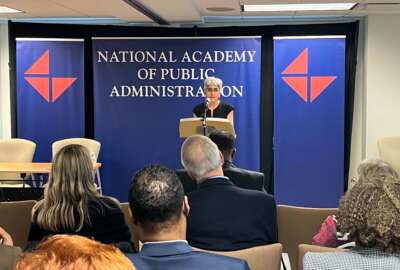
Boasting a 91% success rate, the IRS rakes in $31 billion from tax cheats
In today's Federal Newscast: Boasting a 91% success rate, the IRS rakes in $31 billion dollars from tax cheats. A new director has been named at the NIH to run...
Best listening experience is on Chrome, Firefox or Safari. Subscribe to Federal Drive’s daily audio interviews on Apple Podcasts or PodcastOne.
- The Nuclear Regulatory Commission has a somewhat uncommon strategy to improve workforce retention. The agency uses rotational assignments to incentivize retention. The rotations let feds temporarily work at other organizations or on different projects. Along with helping feds to develop new skills, rotational assignments benefit the agency, too. “It makes folks want to stay with the organization because they know they can get different opportunities. When newer workers come on board, and they see these opportunities, then they know they’ll be able to cross train and do these type of things,” said NRC Deputy Chief Human Capital Officer Eric Dilworth. NRC is one of many agencies trying to retain both early-career and mid-career employees. (How agencies are trying to keep early-career employees in federal jobs – Federal News Network)
- When it comes to recruitment and retention, federal cybersecurity positions remain a high-risk job classification for the federal workforce, according to the Office of Personnel Management. Agencies have made some progress on cyber and IT recruitment, hiring more than 42,000 cybersecurity and IT workers between 2015 and 2020. As a result, cyber professionals now account for about 7% of the federal workforce. Cybersecurity, along with acquisition and human resources, are three federal positions that OPM said still need to make significant progress to close governmentwide skills gaps. (OPM removes two federal skills gaps from it high-risk list, but three positions remain – Federal News Network)
- A new director is taking over a major component of the National Institutes of Health. Dr. Joni Rutter was named to run the National Center for Advancing Translational Sciences (NCATS). She’s been acting director since April 2021, after joining the agency in 2019 as deputy director. Prior to joining NCATS, Rutter established the scientific programs within the NIH “All of Us Research Program” to advance precision medicine, which looks at the genetics, environment and lifestyle of people from all communities and backgrounds in order to select treatment that could work best for them.
- The Defense Department is deciding whether to enter the Thunderdome on a full time basis. DoD’s zero trust prototype initiative called Thunderdome is in the final stages of evaluation. Brian Hermann leads the Cybersecurity and Analytics Directorate at the Defense Information Systems Agency. He said a big decision about whether to move forward with Thunderdome will come in January. “We are doing an evaluation that is very objective. We are using [Joint Interoperability Test Command] as our test and evaluation command to look at it from an operational assessment and from an operational test perspective,” Hermann said. The user experience, Hermann added, also will play a big role in the go-forward decision.
- The IRS’s success rate pursuing tax cheats and other fraudsters rose above 90% in fiscal 2022, accounting for more than $31 billion in financial crimes. The Criminal Investigation annual report said the tax agency also seized assets worth more than $7 billion. In all, IRS law enforcement agents took on more than 2,500 investigations, leading to about 1,600 indictments and almost 1,500 convictions. Violations of the Bank Secrecy Act yielded the most investigations, while corporate fraud had the highest rate of defendants serving jail time.
- New tools to bolster the Freedom of Information Act are in the works. The Justice Department is working with the General Services Administration on new business standards for FOIA technology. The first set of standards will focus on FOIA case management solutions. The Justice Department’s Office of Information Policy is also developing a “FOIA wizard” assistant for FOIA.gov to help citizens make records requests and access documents that are already public. (Justice Department, GSA working on common standards for FOIA tech – Federal News Network)
- The White House has launched a review of critical infrastructure policy. President Joe Biden told Congress that his administration will revise a 2013 presidential directive on critical infrastructure security and resilience. The updated policy will guide how agencies designate certain critical infrastructure entities as systemically important. Biden said there’s an urgent need to improve the cybersecurity of critical infrastructure and establish minimum security requirements.
- Liz Clark is the new director of the Defense Suicide Prevention Office (DSPO). She previously had been acting director since Karin Orvis left the job to go to the Office of Management and Budget earlier this year. As director of DSPO, Clark will develop non-clinical suicide prevention programs that promote and enhance suicide prevention, intervention and postvention. Clark takes the helm in the wake of an annual report released last month showing a slight decrease in military suicide rates over the past year. Military suicides have been increasing in number overall since 2011.
- The House Committee on Veterans’ Affairs is recommending that VA prioritize resources to deliver abortion care to veterans in states where the practice is banned or restricted. The committee also recommended that Congress pass legislation eliminating contraceptive co-pays for veterans. These recommendations come after a committee report found that different state and federal laws make VA employees uncertain how they might be targeted by local authorities.
Copyright © 2025 Federal News Network. All rights reserved. This website is not intended for users located within the European Economic Area.
Peter Musurlian
Peter Musurlian is a producer at Federal News Network.
Follow @PMusurlianWFED




